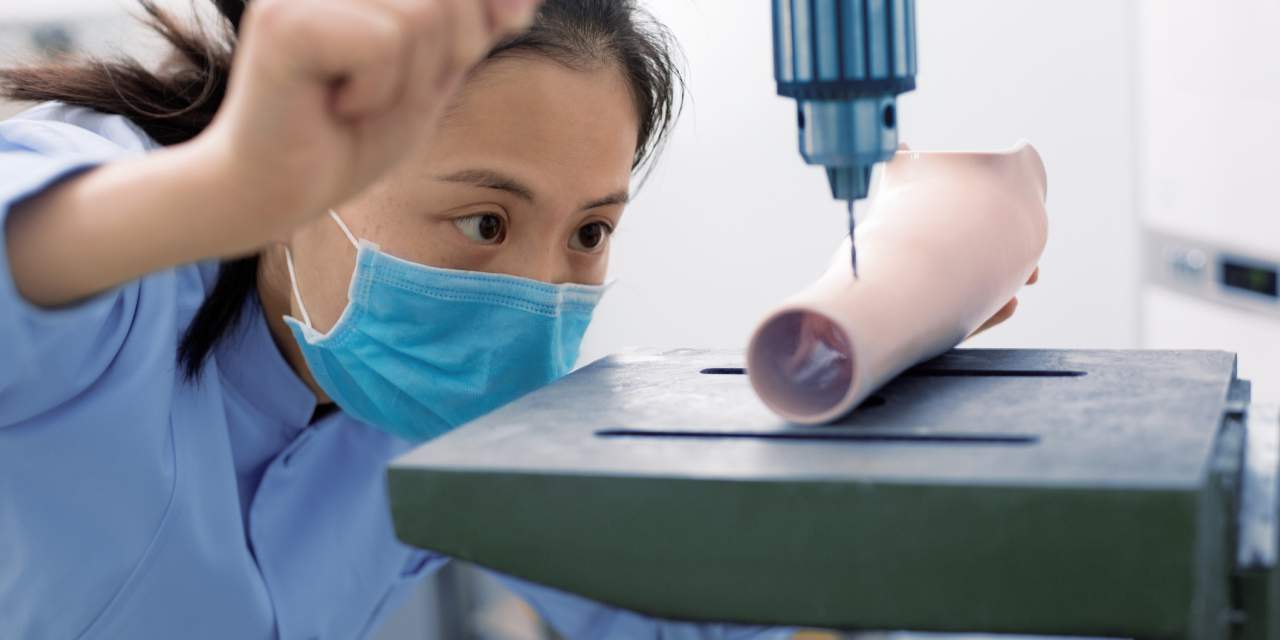
Medical Bionics Challenge Winners
Bionic Mobility Category
MAJOR WINNER - $50,000
Project Title - Bespoke tissue-engineered vascular grafts (TEVGs) via soft robotics
Project Leader: TRENT BROOKS-RICHARDS Team: CODY ALEXANDER FELL, SABRINA SCHOENBORN, MARK ALLENBY (A young and passionate QUT team based at Herston Biofabrication Institute, Metro North Health)
Description
Severe cardiovascular disease (CVD) linked to peripheral artery disease (PAD) often results in critical limb ischemia and limb amputation, with well over 200 million people impacted globally. Bio-resorbable tissue-engineered vascular grafts (TEVGs) seeded with autologous cells that allow complete graft integration and restoration of a native vessel provide an autobionic pathway to optimise limb mobility and minimise amputations. Autobionics is a new and exciting stream of medical bionics where technology does not replace functionality but aids the tissue in regaining its natural functionality. So far TEVGs have not been approved for patient use in part due to their durability. However, soft robots can be made that emulate flexion of the femoropopliteal artery (FPA), providing a more realistic environment for TEVG maturation. The innovation has the potential to reduce co-morbidities and enable limb use to be restored to natural levels.
EARLY STAGE BIONICS INNOVATION AWARD - $5,000
Project Title - Symbiotic Innovations’ lightweight EEG-controlled mobility device
Project Leader: ANDREW SCOTT (SYMBIOTIC INNOVATIONS) Team: DAISY FLOOD, JOE CRONIN, ELLA WATTS, CATHERINE HAYDAY
Description
This innovation connects a new lightweight compressed-air ROAM exoskeleton with a BrainWare control device (EMOTIV) to provide a low-cost mobility solution to assist those who are disabled or living with chronic disease. The project is inspired by young Daisy Flood who has Friedreich’s Ataxia which is a degenerative spinocerebellar disease. Daisy’s mental abilities will continue to grow and develop, but she faces increasing challenges with mobility. The project team is intent on ensuring the devices is of high value to caregivers with an array of features that caregivers identify as helpful to them in carrying out everyday tasks.
Bionic Senses Category
MAJOR WINNER - $50,000
Project Title - Smart Prostheses with a Bionic Sense of Touch
Project Leader: DR AJAY PANDEY (SENIOR LECTURER IN ROBOTICS AND AUTONOMOUS SYSTEMS AT QUT) Team: SEVDA TRIFONOVA, SREYA SINGH, OLIVER CAMPBELL (Previous three are Bachelor of Engineering Students in Electrical and Mechatronics at QUT), LING KUAN KIM (Brisbane Prosthetics and Orthotics), and, DR HEBA KHAMIS (CONTACTILE INC.)
Description
This QUT-led project is set to transform lives and the future of prosthetic devices by embedding innovative touch sensors to smart prosthetics to create a bionic sense of touch. The innovation will bring an accurate sense of pressure, position, and surface deformation in digital form to end users of a prosthetic hand or limb. As a first step, the team is planning to release a trial version of the tactile feedback system with a prosthetic hand or body-powered prosthetic. Brisbane Prosthetics and Orthotics clinic based in Moorooka and delivering prosthetic solutions across Brisbane and Toowoomba will function as the team’s front end interface with end users.
EARLY STAGE BIONICS INNOVATION AWARD - $5,000
Project Title - Hearoes optimises functional outcomes of cochlear implants
Project Leader: ELLIOT MILLER, FOUNDER OF HEAROES Team: DR ELIZABETH KENDALL (MENZIES HEALTH INSTITUTE, GRIFFITH UNIVERSITY), JACKSON FULLER, JAMES HARLOW
Description
Hearoes is a new App that enables young people and adults with a cochlear implant or bionic ear to fast track their rehabilitation with a clinicians platform to further assist with this process. The App contains over 40 gamified activities and modules that provide a proven learning pathway for auditory training and rehabilitation. Hearoes uses Australian-based accents and phonemes in an accessible and dynamic auditory training tool introduced via clinicians.
Neural and AI-Enabled Bionics Category
MAJOR WINNER - $50,000
Project Title – A novel Attention Atlas (VR platform) complemented by AI analysis of an advanced driving game for spatial attention recovery after brain injury
Project Leader: DR DAVID PAINTER, MENZIES HEALTH INSTITUTE, GRIFFITH UNIVERSITY Team: PROFESSOR HEIDI ZEEMAN (MENZIES HEALTH INSTITUTE), BENJAMIN RICHARDS (APOTHECARY FILMS), PROFESSOR TREVOR HINE (HOPKINS CENTRE, GRIFFITH UNIVERSITY)
Description
Among the best predictors of stroke recovery is the initial neurological deficit, which often involves distorted spatial attention, known as ‘visuospatial neglect’. This new-to-the-world AI-Enabled Spatial Attention Assessment and Training System for clinicians and brain injury patients promotes recovery and survival following stroke or accident induced brain injury. The Attention Atlas (a novel VR platform) maps distorted spatial attention in a 360-degree virtual space. Attention Atlas is used in conjunction with a cognitive prosthetic (a modified version of a popular driving game) delivering a positive experience for patients while assessing the effects of the intervention on their spatial attention.
EARLY STAGE BIONICS INNOVATION AWARD - $5,000
Project Title – Deep Connection’s development of a wearable device to provide fine-motor control
Project Leader: NATHANIEL MARSHALL Team: DR MAHA BAKTASHMOTLAGH, DR ANTONY RAPISARDA, CONOR WYVILLE
Description
Deep Connections is developing an AI-enabled wearable device that will deliver neural robotic control of arm and hand movements. The AI-driven wearable device is set to provide people living with limb loss with finer control over robotic prostheses. Designed for people with upper limb loss, the system will interface with robotic prostheses through VR as well as a mobile device. Hardware has been designed to leverage machine learning techniques by capturing more data (256 data points compared to the industry standard 16).
EARLY STAGE BIONICS INNOVATION AWARD - $5,000
Project Title – Cortex Brain Computer Interface
Project Leader: CASEY PFLUGER Team: AMY-ROSE GOODEY, FILIP SARIC
Description:
A grassroots start-up, Cortex is developing a high-quality headset that simultaneously measures brain activity in a similar way to MRI (but without electromagnets) and uses neurofeedback game software to reduce the adverse symptoms of neurocognitive conditions such as autism and ADHD. Real time brain activity is compared to optimal healthy brain activity – the user is rewarded within the game when their brain activity moves to optimal activity.
